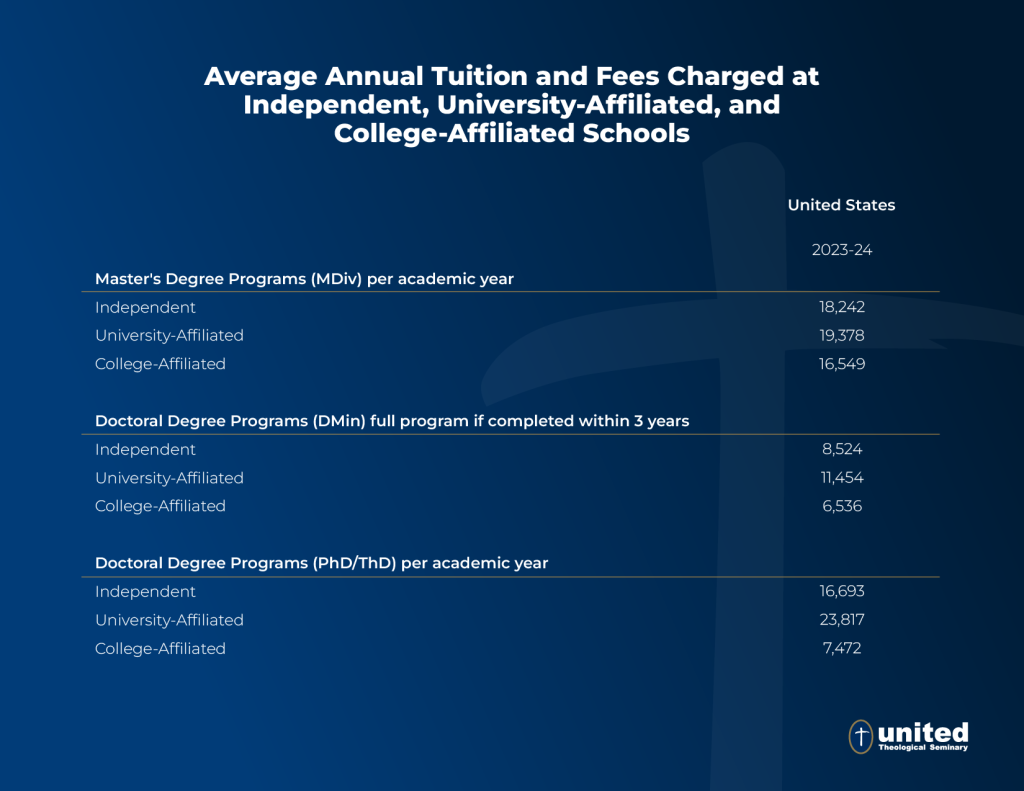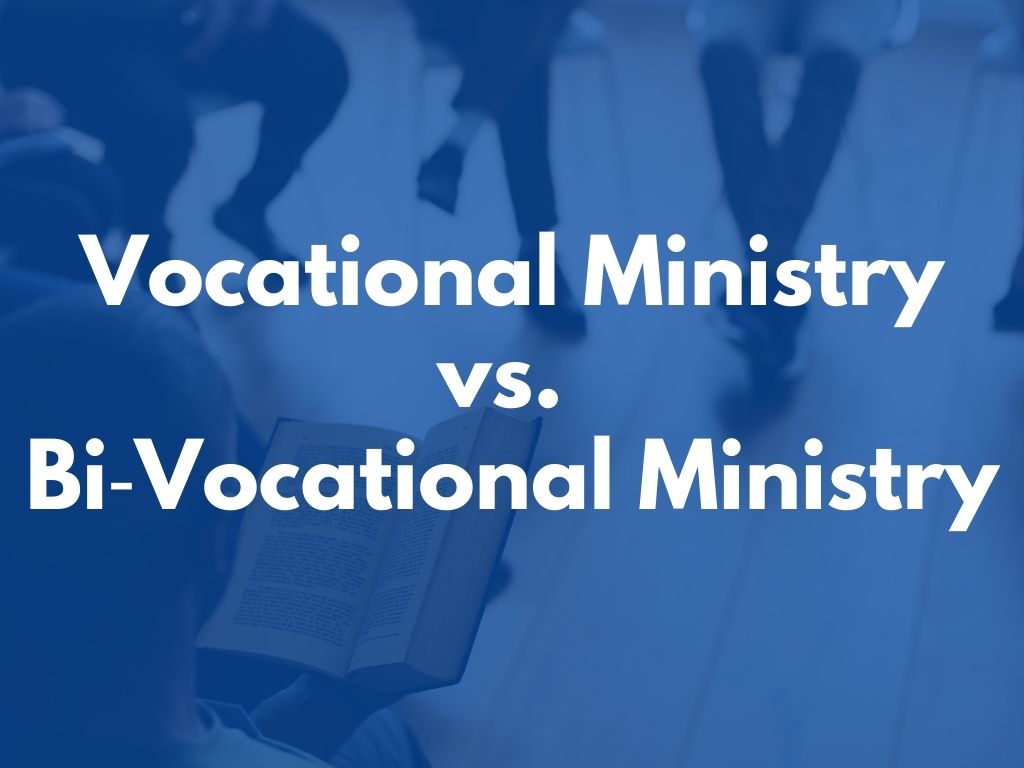Attending seminary is a major life decision that requires careful consideration of the costs involved. A seminary is an educational institution that trains students in theology, ministry and religious vocations. While seminaries aim to provide spiritual enrichment and growth, they also come with a significant financial commitment. Before beginning seminary studies, it is crucial to gain a comprehensive understanding of the expenses you will incur.
This article provides an in-depth look at the common costs associated with attending seminary. We will explore typical tuition rates and student fees, additional expenses like books and housing, as well as financial assistance options. Our goal is to break down the full financial reality of what it takes to complete seminary education. With a clear picture of the costs, you can prepare to invest in your seminary education.
AVERAGE COST OF SEMINARY
The cost of a seminary education can vary widely based on a multitude of factors such as the institution’s prestige, location and whether it’s public or private. On the low end, tuition can be around $10,000 annually, while at the high end, it could climb to over $25,000 per year. This cost typically doesn’t include additional expenses like books, housing and other fees, which can further impact the overall financial investment.https://www.ats.edu/files/galleries/2023-2024-annual-data-tables.pdf

Source: ATS/COA Annual Data Tables, 2023-2024, Table 4.2. Pittsburgh, Pennsylvania: The Commission on Accrediting/the Association of Theological Schools. https://www.ats.edu/files/galleries/2023-2024-annual-data-tables.pdf
Please note that these figures represent a range, and the exact tuition may vary depending on various factors such as institutional specifics, additional fees and changes in rates.
ACADEMIC VS PROFESSIONAL
When comparing an academic versus a professional seminary degree, the primary difference is their objectives and outcomes. An academic seminary degree, such as a Master of Theology (ThM), a Doctor of Philosophy (PhD) in Theology, or a Doctor of Theology (ThD), is usually pursued by those aiming to delve deeper into theological research, often with the intent to teach or engage in scholarly work. On the other hand, a professional seminary degree, like a Master of Divinity (MDiv) or a Doctor of Ministry (DMin), is typically tailored for those who are looking to enter pastoral ministry or other forms of religious leadership, with a focus on practical skills and vocational preparation. Regardless of the type of degree you pursue, it’s important to be informed of the investment you’ll make.
TUITION & FEES
Attending seminary is a major financial investment, so it’s helpful to understand the costs involved. Tuition makes up a significant portion of the total cost, and it can vary dramatically depending on the specific seminary.
When evaluating seminaries, it’s important to look at the entire fee structure. Some schools charge one flat rate, combining tuition, fees and housing costs. Others break this down into separate charges. Seminaries may also charge different rates for part-time vs full-time attendance.
The bottom line is that tuition represents a major portion of seminary costs. Carefully researching this factor for any seminary you are considering can give you the full picture.
View United’s tuition information page
ADDITIONAL FEES
Attending seminary involves more than paying tuition. Students need to consider various additional fees when calculating the overall cost, as these additional expenses can quickly add up.
APPLICATION FEES
Most seminaries charge an application fee that must be paid when submitting the application for admission. This one-time fee helps cover administrative costs involved in processing applications.
TECHNOLOGY FEES
Many seminaries charge a mandatory technology fee each semester. This fee helps cover campus technological infrastructure, such as internet and Wi-Fi access, computer labs, online instructional tools and IT support.
RESOURCE FEES
Some seminaries have additional resource fees that go towards specialized campus facilities and services. For example, fees to support the library, academic resources, student healthcare, or recreational facilities. These fees vary greatly by seminary but can help you understand the type of services and resources each institution is providing to its students.
The additional fees can quickly multiply, especially if you are paying to apply to multiple seminaries. Make sure to account for these expenses when budgeting for the overall cost of seminary. The initial tuition rate is not the only fee you’ll need to pay each semester.
BOOKS & SUPPLIES
The cost of textbooks and other required supplies represents a significant expense for any college or seminary student. Some courses may require just one main textbook, while others could require four or more. With an average course load of 3-5 classes per semester, the cost of books can easily add up, requiring one to budget accordingly.
Some course assignments may require purchasing special academic resources, such as theological journals, Bible software, commentaries, or primary source documents, in addition to traditional textbooks.
Other common seminary supplies include standard academic supplies like notebooks, pens, laptops, printers, etc. Some ways to save money include buying used textbooks, sharing books with a classmate, utilizing the school library, or renting digital textbooks. With some intentional planning, seminarians can reduce the impact of these expenses. But books and supplies should still be factored in when considering the overall investment required to earn a seminary degree.
For a full evaluation of the cost of attendance for United’s programs, you can visit our helpful link on our 2024-2025 Financial Aid budgets
TRANSPORTATION & LIVING
Students must also carefully consider transportation and personal living expenses when weighing the costs of a seminary education.
These expenses vary from student to student depending on their location and the format of their program. For instance, students who choose a hybrid or traditional on-campus format will have to consider where they will live. Although some seminaries offer on-campus housing, others require students to secure their own lodging while they pursue their education. Likewise, they will have to consider the costs of transportation to campus, including car maintenance and fuel.
Although many seminaries offer online formats for their programs, a student who studies remotely might still incur traveling expenses during the course of their degree. For example, some seminary degrees require students to travel annually for gathering weeks, Intensives, Commencement ceremonies, or other on-campus events as part of the program’s academic requirements.
FINANCIAL ASSISTANCE
Financial assistance is often available to help offset the costs of attending seminary. Many seminaries and religious organizations offer scholarships, grants and other forms of aid to make seminary more affordable.
Scholarship and grant amounts vary greatly. Competitive awards could cover over 50% of tuition, while smaller awards may be several hundred dollars. Students should thoroughly research and apply for any and all assistance available. Even small scholarships add up.
SCHOLARSHIPS
A scholarship is funding that does not need to be repaid. There are a variety of scholarships specifically for seminary students. Many seminaries offer merit-based and need-based scholarships. Denominational bodies also often provide scholarships for students who are members. Some additional options include:
Merit-based Scholarships – Awarded for academic achievements or other areas of accomplishment
Need-based Scholarships – Awarded based on a student’s ability to pay for his or her education
Church or Denominational Scholarships – Awarded based on a student’s involvement in an individual congregation or membership within a specific denomination
GRANTS
Grants can come from a variety of sources such as the federal government, the school you are attending, or certain private or nonprofit organizations. Like scholarships, grants generally do not have to be repaid.
Need-based Grants – For students demonstrating financial need with the amount awarded based on need and funds available
Foundation/Organization Grants – Religious foundations and organizations offer grants for seminary students who meet certain criteria
Federal Work-Study Programs – Provide jobs for students with financial need. Earnings are paid partially through a federal grant
LOANS
Loans allow students to borrow money to attend school now, with the intent of paying the money back later with interest.
Federal Unsubsidized Loans –Federal loans are offered by the U.S. Department of Education to help eligible students cover the cost of higher education
Financial assistance amounts vary, depending on the type(s) for which you apply, the organizations offering the assistance, and the funding available each year. Competitive scholarships and grants could cover half or more of tuition costs, while smaller awards may equate to several hundred dollars. Research your options and carefully evaluate the repayment requirements of loans so that you can apply to the forms of financial assistance that will be most beneficial to you.
For more information about United’s Student Aid opportunities, please visit our Student Aid page.
DENOMINATION/CHURCH ASSISTANCE
Denominational assistance is funding received from a student’s denomination to help with educational costs.
Many denominations and individual churches provide financial support for seminary students committed to ministry in that denomination. For example:
- Some churches require future ministers to work for them during seminary. This provides income and experience while also covering tuition costs.
- Denominational bodies offer discounted tuition rates for students entering ministry in their denomination.
- Direct financial assistance is available through some church bodies and congregations. This aid helps cover tuition, fees, living expenses, etc.
- Some institutions provide matching grants to accompany denominational assistance. For example, United will match conference funds received on behalf of a United Methodist student enrolled in a master’s or the Doctor of Ministry program not to exceed tuition and fees.
The amount and type of assistance depend on the policies and resources of the particular denomination or church. Students should speak to their church leaders about assistance opportunities. This support enables many students to attend seminary who otherwise could not afford it.
CONCLUSION
Attending seminary is a significant decision that requires thoughtful consideration and financial planning. With institutional tuition ranging in cost, additional fees contributing to the overall expenses, and the purchase of books and supplies, the total expenditure can become substantial. Yet, it’s important to remember that financial assistance opportunities, including scholarships, grants, loans and denominational or church assistance, can make a seminary education more accessible.
Investing in your seminary education is not just a monetary commitment but an investment into your spiritual growth, ministry preparation and future vocational work. As you consider this path, consider the costs as well so that you can make an informed decision about the best place to support your calling.
Some of the data used in this analysis are derived from Sensitive Data Files of the ATS/COA, obtained under special arrangements designed to protect the anonymity of respondents. These data are not available from the authors. Persons interested in obtaining ATS/COA Sensitive Data Files should contact ATS Director of Research at research@ats.edu.Analyses and interpretations of the Commission’s data are the researcher’s and may not reflect those of the Commission on Accrediting or the Association of Theological Schools.



